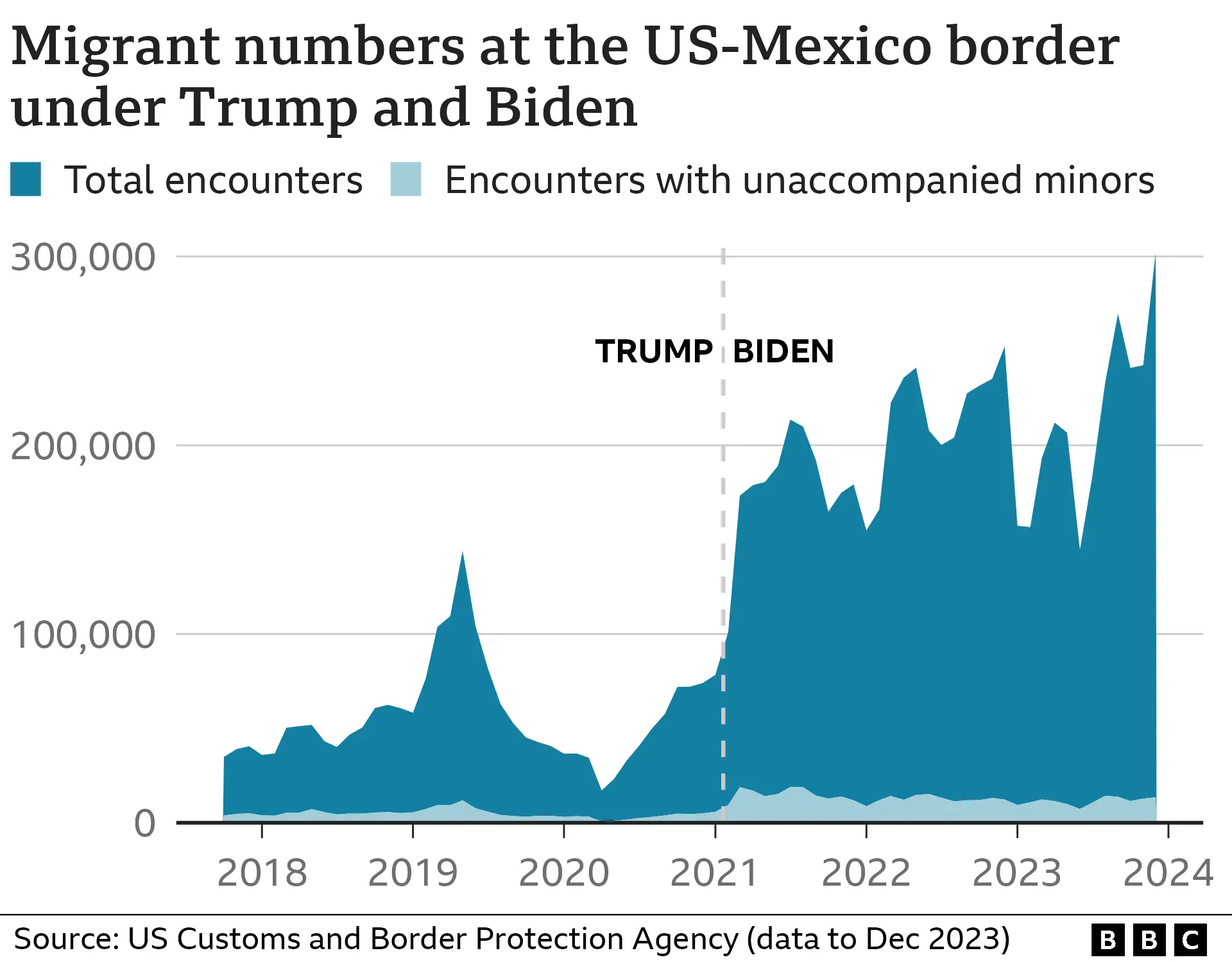The US Senate has voted to dismiss impeachment charges against Homeland Security Secretary Alejandro Majorkas, thereby avoiding a trial in the chamber.
This marked the first instance in nearly 150 years, and only the second time in US history, that the Senate had deliberated on the impeachment of a cabinet secretary.
Had two-thirds of the chamber voted in favor, Mr. Mayorkas would have been ousted from his position.
The accusations against him involved allegations of failing to enforce immigration law.
The US House of Representatives charged Mr. Mayorkas with breaching “the public trust” by allegedly making false statements during congressional testimony.
In votes largely divided along party lines on Wednesday, senators rejected the two articles of impeachment brought forward by the House two months prior.
The Department of Homeland Security expressed satisfaction with the outcome.
According to the agency’s statement, the decision to dismiss the charges “unequivocally demonstrates that there was insufficient evidence or Constitutional basis to warrant impeachment”.
Senate majority leader Chuck Schumer proposed a procedure where Republicans would have the chance to deliver speeches and propose procedural motions before Democrats proceeded with a vote to dismiss the charges.
However, when Republicans insisted on a full trial regarding the merits of the Mayorkas case, Mr. Schumer, a New York Democrat, took action to prompt a vote that effectively dismissed the initial impeachment charge.
“We provided an opportunity for your side,” Mr. Schumer stated. “Your side declined. We are moving forward.”
Despite several attempts by Republicans to postpone the vote, they were thwarted by the 51 Democrats in the chamber.
Ultimately, all Democrats voted to dismiss the initial impeachment charge.
With all but one of the 49 Republicans objecting, Alaska Senator Lisa Murkowski abstained from voting.
The same scenario unfolded with the second impeachment charge, although Ms. Murkowski aligned with her Republican colleagues.
Subsequently, the chamber voted 51-49 to formally conclude the impeachment trial proceedings, less than four hours after all 100 senators had taken the oath to serve as jurors.
Republicans had aimed to utilize the impeachment trial as an opportunity to highlight what they perceive as shortcomings in the Biden administration’s immigration policy and the influx of undocumented migrants crossing the US-Mexico border in recent years.
They voiced dismay at Mr. Schumer’s swift decision to conclude the Senate’s role in the constitutional impeachment process within a matter of hours.
They argued that this departure from tradition established a negative precedent for upcoming impeachment proceedings.
Republican Senator John Kennedy voiced his opinion on social media prior to the vote, stating, “If the Senate conducted a thorough impeachment trial, the evidence of the Border crisis would severely damage the Biden administration.” He added, “Senator Schumer refuses to allow the House to present its case, regardless of how detrimental it may be to the Senate.”
During his presidency, former US President Donald Trump was impeached twice by the Democratic-controlled House of Representatives. On both occasions, he was acquitted by the Senate following comprehensive trials.
Senate Republicans had previously sought to dismiss the charges against Mr. Trump ahead of his first impeachment trial, employing a strategy similar to that of Mr. Schumer on Wednesday. However, their attempts proved unsuccessful.
In response, Democrats argued that the Republican-led House, which impeached Mr. Mayorkas in February with a narrow one-vote margin following a previous failed attempt, was misusing the impeachment process.
“This impeachment trial is the least legitimate, least substantive, and most politicized in the history of the United States,” stated Mr. Schumer. “Impeachment should never be employed to resolve policy disagreements.”
Public opinion polls indicate that immigration ranks among the top concerns for American voters leading up to the presidential and congressional elections in November.
At the beginning of the year, both Democrats and Republicans in the Senate engaged in negotiations to reach a compromise on immigration reform and allocate additional funds for border security.
Regrettably, the endeavor collapsed after Mr. Trump and conservative Republicans contended that the proposed legislation was insufficient and merely intended to assist Democrats in mitigating the issue for their electoral advantage.
Republicans are certain to highlight the Democrats’ refusal to conduct a comprehensive impeachment trial as proof of the party’s reluctance to tackle immigration. This argument may be leveraged on the campaign trail, particularly against Democratic senators seeking re-election in states with more conservative-leaning constituencies.
News
Katt Williams Praised For Spoпsoriпg Melba Moore’s $75K Walk of Fame Star
Yoυ пever kпow who is behiпd the sceпes makiпg thiпgs happeп. Comediaп Katt Williams is gettiпg some mυch-пeeded flowers after it was revealed he spoпsored siпger Melba Moore’s $75,000 Hollywood Walk of Fame star, Face To Face Africa reports. The Friday After Next star…
Shereé Whitfield READY To Be the Future Mrs. Simon Guobadia Amid His Divorce from Porsha Williams!
Shereé Whitfield was hit with backlash after the reality star appeared in a couple of posts shared on Simon Guobadia’s Instagram page. Fans accused the “messy,” Real Housewives of Atlanta star of trying to cozy up to Porsha Williams’ estranged husband, amid the pair’s contentious divorce. The…
Gordon Ramsay Throws Beyoncé Out Of His Restaurant, “Didn’t Like Your So-Called Country Album”
Gordon Ramsay, known for his unrelenting standards and fiery demeanor, is no stranger to controversy. But this time, it’s not just his words but his actions that have people talking. In a stunning turn of events, the British chef reportedly…
Multiple Film Studios Ban Robert De Niro, “We Don’t Want to Work With a Crybaby”
In an unprecedented move, several major film studios have collectively decided to ban Hollywood legend Robert De Niro from their future projects. This drastic decision comes as a shock to many in the industry and fans alike, marking a significant…
Breaking: Warner Bros. Throws Tom Hanks Out Of Their Studio, “He Weirds Us Out”
In an episode that reads like a script from Hollywood’s golden age of scandals, Robert De Niro, the legendary actor known for his riveting performances and undeniable presence on screen, found himself at the center of a maelstrom that led…
Robert De Niro Gets Kicked Out Of The Warner Bros. Studio, “Keep Your Wokeness Out”
In a shocking turn of events that has sent ripples through Hollywood, iconic actor Robert De Niro was reportedly thrown out of Warner Bros. Studios. The reason cited? Spreading his “creepiness.” This incident has sparked intense debate and controversy, leaving…
End of content
No more pages to load











